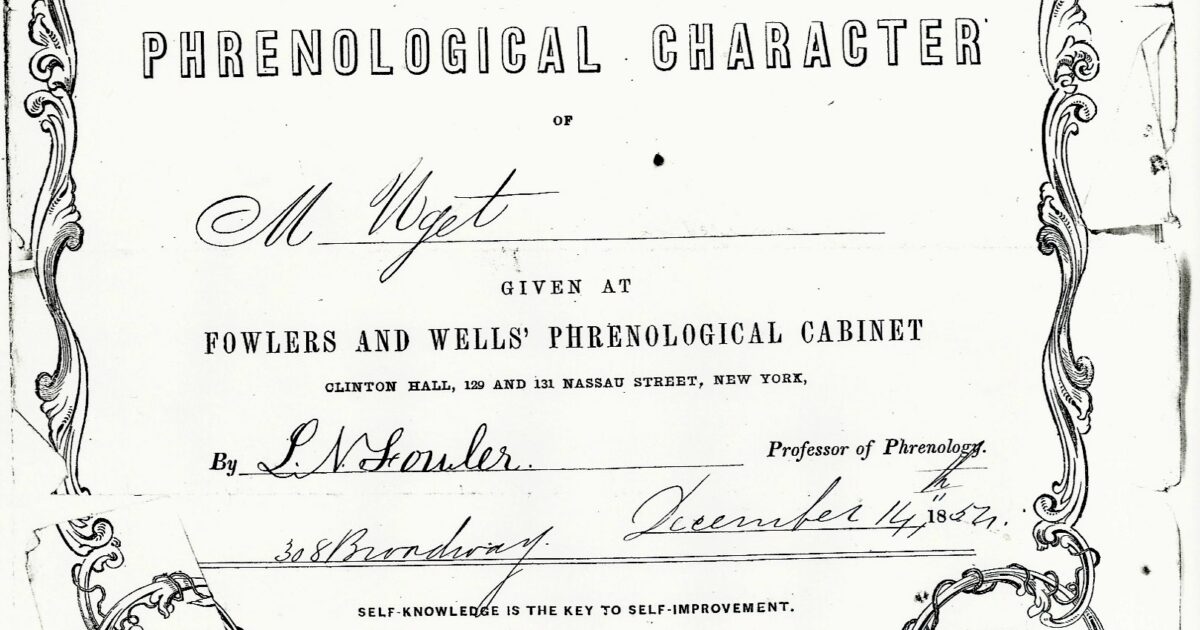Science
Uugaq’s Curious Encounter with a Phrenologist in 1854

In December 1854, an Inuk hunter named Uugaq, identified at the time as Mr. Uget, made headlines during his visit to New York City. Among the various experiences he encountered, a visit to the Fowlers and Wells’ Phrenological Cabinet stands out as particularly striking. This pseudoscience, which gained popularity in the 19th century, claimed that the shape of a person’s head could reveal insights into their character and personality traits.
Phrenology, developed by German physician Franz Joseph Gall around 1800, posited that the brain was divided into areas responsible for different traits, such as self-esteem and aggression. Practitioners believed they could determine a person’s characteristics by examining the contours of their skull, a practice colloquially known as “reading bumps.” While it was once fashionable, phrenology is now regarded as discredited and often associated with humorous or drunken late-night discussions.
On December 14, 1854, Uugaq underwent an examination by Dr. Fowler, a prominent figure in the field. The report from this examination offered a fascinating glimpse into both Uugaq’s character and the biases of the era. Dr. Fowler noted that Uugaq’s head resembled that of a European, suggesting he was “less savage, revengeful and cruel” than the average North American Indigenous person. This assessment reflects the prevailing stereotypes of Indigenous peoples at the time.
The phrenological report highlighted Uugaq’s affection for his family, stating he exhibited “more affection, friendship, love of wife and children, and interest in family and domestic enjoyment than the Indians generally have.” Such comments reveal the cultural misunderstandings and assumptions present in the 19th-century society. A contemporary newspaper even described Uugaq as “merely a short, fat Indian,” further underscoring the simplistic views held by many New Yorkers.
Dr. Fowler’s findings continued with a mix of positive and negative traits. He described Uugaq as “kind, generous, sympathetic and comparatively humane,” while also noting he lacked “dignity, pride, manliness, self-love, and a haughty aspiring mind.” The report also pointed out Uugaq’s ambition and sensitivity to others’ opinions, indicating a complex personality that defied easy categorization.
In an intriguing turn, the doctor claimed Uugaq possessed strong perceptive faculties, excellent memory, and talents in drawing, suggesting he could excel in various skills. The report even commented on his digestive health, stating he had “better digestion than the white man,” highlighting the bizarre nature of phrenological assessments.
Uugaq’s visit concluded, he returned to Groton, Conn., where he spent Christmas with Sidney O. Budington, a veteran whaler. This brief respite offered Uugaq a moment of peace before his return to the Arctic. On April 11, 1855, he reboarded the Georgiana with Captain Budington, ultimately returning to his family in Frobisher Bay.
This peculiar chapter in Uugaq’s journey underscores the cultural exchanges and misunderstandings of the 19th century. The examination he underwent remains a curious reflection of a time when pseudosciences were taken seriously, and individuals were often judged by superficial metrics.
Kenn Harper, a historian and author who has spent over 50 years in the Arctic, reflects on these historical events through his column, “Taissumani.” His work sheds light on the complexities of Indigenous identities and experiences in a rapidly changing world. For feedback or inquiries, Harper can be reached at [email protected].
-

 World4 months ago
World4 months agoScientists Unearth Ancient Antarctic Ice to Unlock Climate Secrets
-

 Entertainment4 months ago
Entertainment4 months agoTrump and McCormick to Announce $70 Billion Energy Investments
-

 Lifestyle4 months ago
Lifestyle4 months agoTransLink Launches Food Truck Program to Boost Revenue in Vancouver
-

 Science4 months ago
Science4 months agoFour Astronauts Return to Earth After International Space Station Mission
-

 Technology2 months ago
Technology2 months agoApple Notes Enhances Functionality with Markdown Support in macOS 26
-

 Top Stories3 weeks ago
Top Stories3 weeks agoUrgent Update: Fatal Crash on Highway 99 Claims Life of Pitt Meadows Man
-

 Sports4 months ago
Sports4 months agoSearch Underway for Missing Hunter Amid Hokkaido Bear Emergency
-

 Politics3 months ago
Politics3 months agoUkrainian Tennis Star Elina Svitolina Faces Death Threats Online
-

 Politics4 months ago
Politics4 months agoCarney Engages First Nations Leaders at Development Law Summit
-

 Technology4 months ago
Technology4 months agoFrosthaven Launches Early Access on July 31, 2025
-

 Top Stories2 weeks ago
Top Stories2 weeks agoFamily Remembers Beverley Rowbotham 25 Years After Murder
-

 Top Stories5 days ago
Top Stories5 days agoBlake Snell’s Frustration Ignites Toronto Blue Jays Fan Fury




















